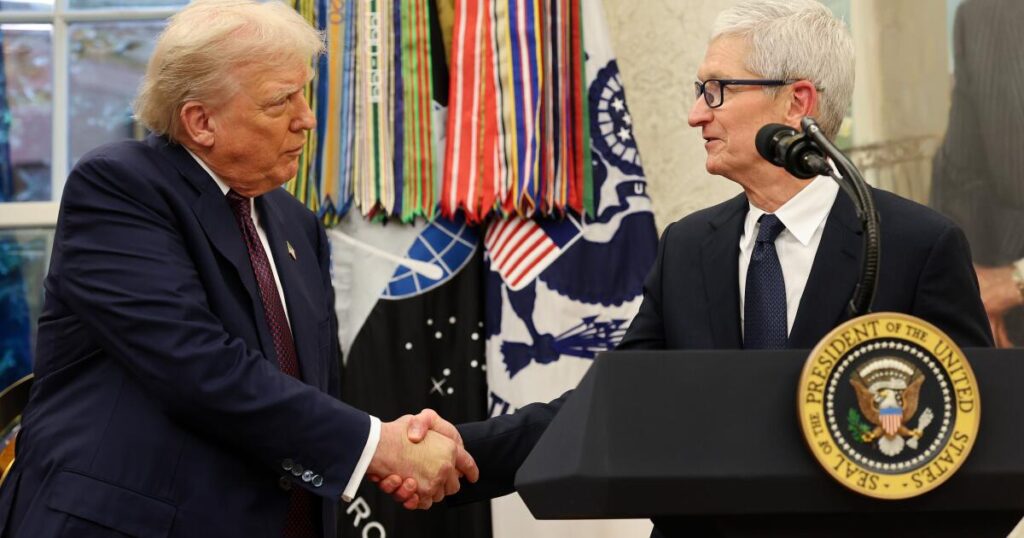President Trump is scheduled to dine with tech executives from Apple, Meta, Google and OpenAI on Thursday night at a White House event in the newly renovated Rose Garden.
The gathering is the latest example of how the world’s most powerful tech leaders are forging stronger ties with Trump’s second administration.
There’s one high-profile tech executive who won’t be at the gathering: Tesla and xAI Chief Executive Elon Musk, who backed Trump but then feuded with the president after temporarily leading an effort to slash government spending.
Musk posted on X that he “was invited, but unfortunately could not attend” and a representative would show up on his behalf.
The Hill first reported that roughly two dozen tech and business leaders, including Meta Chief Executive Mark Zuckerberg, Apple Chief Executive Tim Cook, Microsoft co-founder Bill Gates, Google Chief Executive Sundar Pichai and OpenAI Chief Executive Sam Altman, are on the invite list. The gathering is scheduled to take place after First Lady Melania Trump hosts an event for the new Artificial Intelligence Education task force.
“The president looks forward to welcoming top business, political, and tech leaders for this dinner and the many dinners to come on the new, beautiful Rose Garden patio,” White House spokesperson Davis Ingle told the Hill.
Meta declined to comment. Apple and xAI didn’t immediately respond to a request for comment.
Ahead of the dinner, Microsoft and OpenAI announced ways the companies are supporting the White House’s efforts to expand AI literacy. As AI disrupts industries including entertainment and healthcare, workers have expressed anxiety about whether they will lose their jobs.
OpenAI said it’s working with businesses such as Walmart and John Deere to build a platform that will help employers find workers with AI skills. The San Francisco tech company, which also has a platform where people can learn about AI, plans to offer certifications so workers can showcase how much they know about the technology. OpenAI said it aims to to certify 10 million Americans by 2030.
Microsoft outlined several ways it’s trying to help students and workers learn more AI skills through its grants, partnerships and products, including offering a year of Microsoft 365 Personal — which includes the company’s AI assistant Copilot — free for all U.S. college students if they sign up before the end of October.
“AI is the defining technology of our time, and how we empower people to use it will shape our country’s future,” said Microsoft Chief Executive Satya Nadella, who is also expected to attend the dinner, in a video. “That’s why we are so grateful to the President, First Lady and the entire administration for making it a national priority to prepare the next generation to harness AI’s power.”
Silicon Valley tech executives had a contentious relationship with Trump during his first term, sparring with the president over issues such as immigration.
They’ve struck a more friendly tone with the president during his second term as they push for a more hands-off approach to regulation while competing to dominate the artificial intelligence race.
In July, the Trump administration released an action plan that aimed to cut “red tape” so tech companies can quickly develop and deploy AI technology as they go head-to-head with firms in China and elsewhere. Trump tapped venture capitalist David Sacks, who is also expected to attend Thursday’s dinner, to guide the White House’s policy on AI and cryptocurrency.
As tech companies charge ahead, child safety and advocacy groups have raised concerns there aren’t enough guardrails in place to protect the mental health of young people as they spill their darkest thoughts to chatbots.
Trump has also publicly criticized many tech executives before striking deals with them. After Trump called for the resignation of Intel Chief Executive Lip-Bu Tan over alleged conflicts related to his reported investments in Chinese companies, tensions cooled after they met. Intel then announced in August that the U.S. government would take a roughly 10% stake in the semiconductor company.
Trump also struck an unusual deal with Nvidia and Advanced Micro Devices that allows the companies to sell certain chips to China in exchange for giving the U.S. government a 15% cut of those sales.
This raised questions among politicians and legal experts about whether that agreement is legal. Nvidia previously said it would spend up to $500 billion over the next four years on AI infrastructure.
Other tech executives have shown support for building in the United States as they face the threat of tariffs from the Trump administration. They also donated to Trump’s inaugural fund after he won the presidential election and have been showing up at high-profile events.
Apple in August pledged to spend an additional $100 billion on domestic manufacturing, bringing its total U.S. investment commitment to $600 billion after Trump criticized the company for expanding iPhone manufacturing in India.
OpenAI, Oracle and SoftBank announced this year that they planned to invest a total of $500 billion in U.S. AI infrastructure over the next four years.
